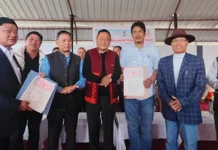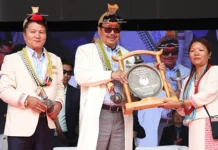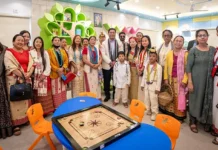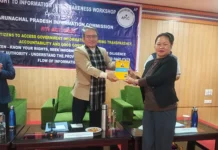[ Shina Nyamtey ]
As a young resident of Tirap district – a serene yet underserved landscape of Arunachal Pradesh – I pen this article with a profound sense of urgency and hope.
I harbour dreams of a brighter future brimming with opportunities for personal and communal growth. Our district, blessed with rich biodiversity, with over 70% forest cover and a resilient populace of farmers, students, unemployed youths, and aspiring entrepreneurs, holds immense untapped potential. However, this potential remains largely unrealized due to a persistent and troubling information gap that keeps vital government initiatives out of reach for the majority.
Government schemes such as the Deen Dayal Upadhyaya Swavalamban Yojana (DDUSY), the Pradhan Mantri Formalisation of Micro Food Processing Enterprises (PMFME), and various Micro, Small, and Medium Enterprises (MSMEs) are designed precisely to empower individuals like us. The DDUSY, for instance, provides low-interest loans and skill development support to kickstart small businesses, enabling unemployed youths to turn innovative ideas into sustainable ventures. The PMFME offers technical assistance, credit linkages, and market access for micro food processing units, allowing farmers to harness our abundant agricultural wealth – be it pineapples, oranges, or traditional herbs – into value-added products that could boost local economies. Similarly, MSME initiatives facilitate technology upgrades, export promotions, and financial aid for small-scale entrepreneurs, fostering job creation and self-reliance in a region where unemployment rates among the youths remain alarmingly high.
Yet, in Tirap, these life-changing opportunities often go unnoticed and unutilized. Growing up in Tirap, I have witnessed firsthand how students miss out on scholarships and educational grants, farmers forgo agricultural subsidies and modern farming techniques, and young entrepreneurs remain unaware of workshops, loan deadlines, and application processes. This is not due to a lack of ambition or capability among our people, but rather a systemic failure in disseminating information effectively. Critical updates on job openings, advertisements, skill-training programmes, and government plans rarely permeate beyond a select few, leaving the broader community in the dark.
The root of this issue lies in the administration’s outdated and inefficient communication practices. In an era dominated by digital connectivity, where over 70% of Arunachal’s youths are actively engaged online via smartphones and social media, the administration clings to archaic methods: posting notices merely on physical notice boards and dispating hard copies to zilla parishad members (ZPMs), MLAs, gaon buras (GBs), NGOs, community-based organizations (CBOs), and heads of departments (HoDs). These approaches are not only distorted by delays and limited reach but are also woefully inadequate in a fast-paced world.
There is no specific official Facebook page, WhatsApp channel, or any dynamic social media presence of the district administration or the Department of Information and Public Relations (DIPR), Tirap, to broadcast real-time updates. A single well-timed post could instantly reach thousands across remote villages and across cities, providing details on application forms, eligibility criteria, deadlines, and success stories, empowering residents to act swiftly and equitably.
This digital absenteeism is not just a oversight; it borders on negligence in 2025, when technology has democratized information access globally. Despite repeated appeals to the authorities, including direct representations to the administration and DIPR, Tirap, the response has been dishearteningly minimal.
Just a couple of days ago, I attempted to ignite a constructive dialogue by posting these concerns in a local Facebook group referred to as ‘The Tirap News'(TTN), which boasts over 51,000 members -including ordinary citizens, students, and even officials from DIPR and the district administration. My intent was straightforward: to advocate greater transparency and accountability, ensuring that schemes meant for the underprivileged reach every deserving individual, not just an elite few with insider connections.
Regrettably, my efforts were met with dismissal. Officials labelled my concerns ‘baseless’ and ‘biased’, undermining the validity of a genuine plea from a concerned citizen. To compound the injustice, my TTN profile was subsequently suspended without any prior explanation, effectively silencing many voices until 24 September – the very date of this letter.
This incident not only stifles personal expression but raises a profound and painful question: are the voices of Tirap’s youths being systematically suppressed for daring to demand what is rightfully ours – access to opportunities that could uplift our communities?
Tirap’s residents, whether in bustling Khonsa or a remote corner like Noglo, are ordinary yet extraordinary individuals: youths scrolling through social media in search of inspiration, farmers toiling under the sun to sustain families, and entrepreneurs envisioning ways to leverage our natural resources for prosperity. Our district’s biodiversity offers endless possibilities – from ecotourism ventures to agro-based industries – but without timely information, these remain mere dreams.
Who, then, bears accountability for the lost scholarships, unclaimed subsidies, and untapped entrepreneurial potential? The onus falls squarely on those entrusted with governance to bridge this divide.
In light of these challenges, I earnestly urge the district administration and DIPR Tirap to take immediate and decisive action.
- Launch dedicated digital platforms: Establish an official Facebook page and WhatsApp channel for the district administration and all relevant departments. These should be used to share timely updates on schemes, job vacancies, events, and deadlines, ensuring that information flows seamlessly to every circle and village in Tirap.
- Extension of scheme accessibility: Publicly confirm the active status of programmes like DDUSY, PMFME, MSME, and others in Tirap. Provide clear, step-by-step application details, including online portals, required documents, and contact points, where deadlines are imminent or have passed, consider extensions to allow broader participation, preventing exclusion due to awareness lapses.
- Foster open and inclusive dialogue: Safeguard community platforms like TTN as spaces for free expression and constructive criticism. Instead of suspensions or dismissals, encourage officials to engage transparently, addressing concerns and building trust. This would transform social media from a battleground into a collaborative tool for progress.
- Engage the community proactively: Organize regular awareness campaigns and on-ground sessions tailored to the needs of youths, farmers, and entrepreneurs. Invite direct feedback to refine initiatives, ensuring they align with ground realities and truly empower the marginalized.
Tirap’s youths are a force of resilience, fueled by dreams of progress, self-reliance, and pride in our cultural heritage. A transparent, digital-first approach to information sharing can convert these dreams into tangible realities, fostering inclusive development and reducing inequalities. Let us not permit another generation to lose opportunities due to inaction.
The time for transformative change is now for every young person in Lazu, every farmer in Deomali, every entrepreneur in Dadam, every aspiring individual in Kolam and beyond who dares to envision a thriving Tirap.
I appeal to the authorities to heed this call and to fellow citizens to join in amplifying it. Together, we can ensure that government schemes serve as ladders to success, not elusive mirages. (The contributor is information & public relations secretary, All Ollo Students’ Union, Tirap district)




